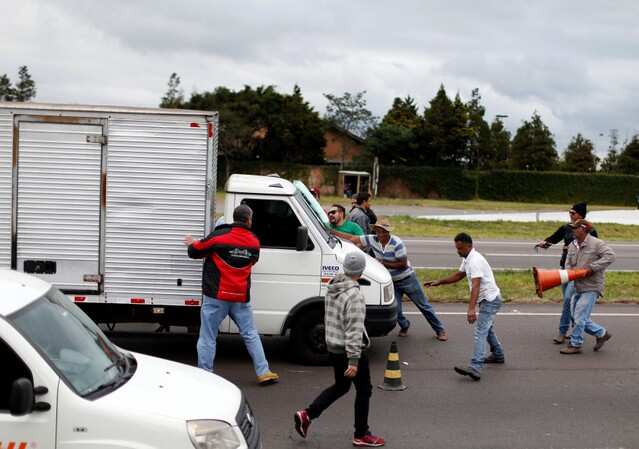 Rio de Janeiro: A mega-strike by Brazilian truck drivers furious over high fuel costs entered day nine Tuesday, but saw an easing of the transport nightmare that has paralyzed Latin America's biggest economy and rattled the unpopular government.
Rio de Janeiro: A mega-strike by Brazilian truck drivers furious over high fuel costs entered day nine Tuesday, but saw an easing of the transport nightmare that has paralyzed Latin America's biggest economy and rattled the unpopular government.With reports of some key roadblocks lifted by truckers and an increase in the flow of fuel from refineries, buses and goods vehicles slowly started to get back on the road.
Rio de Janeiro, where almost all gas stations have been shut for several days, saw some fuel deliveries Tuesday. A column of at least 150 food trucks, escorted by armed soldiers, also made it into the city, where many supermarkets have run out of fresh products, an AFP reporter said.
Public schools in Rio reopened Tuesday after a day of being closed.
In Sao Paulo, the big Ribeirao Preto oil terminal was back online after the truckers' blockade was lifted. Shares in state-controlled oil major Petrobras shot up nearly 11 percent in Sao Paulo stock market trading, rebounding from a more than 14 percent drop Monday.
But some truckers and other protesters remained determined to hold on, even though initial demands for cheaper fuel were met on Sunday.
The stubbornness of part of the truckers surprised the center-right government and even some union leaders, prompting allegations that the protests were being manipulated to try and bring down President Michel Temer.
The result was that in much of the country transport remained paralyzed, crippling the vast agricultural industry and making commutes a nightmare for millions.
Ten airports remained out of aviation fuel, the Infraero airports' administration said.
At a food wholesale market in Rio, merchant Betinho Rodrigues said the supply was getting better but a long way from resolved.
"The situation's still critical. There isn't that much merchandise and it's expensive. This will take time," Rodrigues told AFP while shopping for tomatoes.
The crisis lingered despite Temer agreeing on Sunday to a key demand of the strikers to cut the price of diesel fuel. Late Monday, Temer said he had "absolute conviction that between today and tomorrow" the crisis would finally end.
Experts say that even if the strike winds down soon, the knock-on effects could take weeks to settle, dealing a severe blow to an economy struggling to grow again after a record deep recession that last two years.
- Bringing down government? - The crisis comes ahead of October presidential elections where voters are in an angry, anti-establishment mood.
Temer, who is Brazil's most unpopular president in history, is not running for reelection and some activists said the truck strike could be used to spearhead his early departure.
At a road block set up by truckers outside Rio de Janeiro, an AFP reporter saw numerous signs calling for a military coup, while others spoke of ousting Temer.
"We've had enough of all this corruption. If more people come out into the streets, the government will fall, it's sure," said Tango Roxa, an electrical appliances salesman who joined the truckers to express his support.
The president of the Brazilian Association of Truck Drivers, Jose da Fonseca Lopes, alluded to this hardening of opinions, saying that "it's no longer truckers who are on strike.... It's people who want to bring down the government. I've got nothing to do with these people."
A key Temer minister, Eliseu Padilha, spoke of unidentified groups "infiltrating the movement with different, essentially political goals."
A poll by Ideia BigData found that 95 percent of Brazilians disapproved of his handling of the situation, even if 55 percent opposed the strike itself.
Temer took power in controversial circumstances in 2016, following the impeachment and removal from office of his leftist predecessor Dilma Rousseff for breaking budget rules.
The president's market-friendly, center-right government launched into sweeping austerity reforms that have been widely praised by investors as a bid to return Brazil to fiscal health, but proved hugely unpopular with ordinary Brazilians.